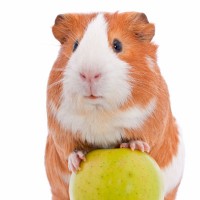Have you recently adopted a Guinea pig? These cute little furballs, also known as cavies, can make absolutely wonderful pets! Read on as an Ellicott City, MD vet offers some helpful tips on caring for your tiny buddy.
Cage
A comfy cage is very important! For one cavy, we recommend getting a cage that is at least 7.5 square feet. If you get more than one, you’ll need a bigger cage. We recommend a mesh or wire cage with a solid bottom. You’ll need to add a suitable substrate, such as aspen. Avoid pine and cedar products, as they aren’t safe for Guinea pigs. Your pet will also need a hidey-hole, and perhaps a few cozies, which are basically tiny sleeping bags for cavies. To maximize your pet’s space, consider getting a two-story cage.
Food
Proper nutrition is a cornerstone of any good pet care routine. Your little buddy can have commercial food for his main meals. You’ll want to supplement this with lots of fresh grass hay and safe, suitable produce. Include plenty of foods that contain Vitamin C, which is crucial to your cavy’s health. Ask your vet for specific advice, including safe and unsafe foods, portion sizes, and treat recommendations.
Toys
Offer your Guinea pig plenty of toys, including lots of chewable playthings. Store-bought toys are fine, but there are also lots of great DIY toys you can make out of common household items. For instance, the cardboard tubes from toilet paper rolls make terrific cavy toys. Many wood, wicker, or cardboard items are also safe. Just be sure to avoid items with small parts or sharp edges, as well as anything covered in paint, varnish, or dye.
Playtime
Living in a cage can get boring! Give your Guinea pig some supervised playtime every day. Spend some time with your pet when he’s out of his cage: pet him, play with him, and talk to him. You can even try teaching your cavy some cute tricks!
Veterinary Care
Cavies need regular veterinary care to stay happy and healthy. Ask your vet to recommend an appointment schedule. At home, watch for potential signs of illness, such as lethargy, diarrhea, unusual vocalizations, and weight loss. Contact your vet immediately if you notice anything unusual.
Do you have questions or concerns about your pet’s health or care? Contact us, your Ellicott City, MD animal clinic, anytime!





